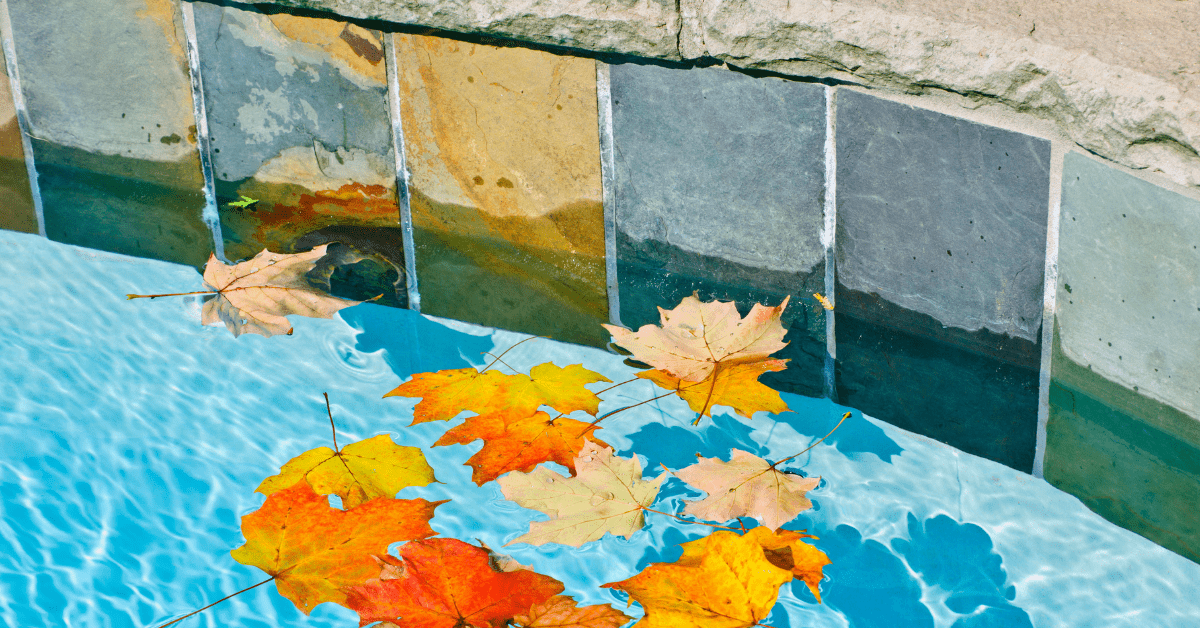As fall approaches, swimming pool owners are faced with closing their backyard oasis and protecting their investment from the winter months. But, when? The answer to this question is largely subjective and as unique as each backyard. There are several things to consider. Keep in mind that the longer water remains stagnant in warm temperatures, the more likely you are to grow algae and if you are growing algae in the fall, it will be there in the spring. On the opposite end of the fall timeline, your pool should be winterized to protect from freeze damage before freezing conditions occur. So, that leaves a considerable amount of time between the beginning of fall and the start of winter. Consider several things when deciding when to close your pool.
How much will you still be using your pool? The fall can be a busy time for families once kids go back to school. The pool can require a little more TLC in the fall to keep it in swimming shape. The change in temperature can affect water chemistry and the pool can begin to collect falling leaves. If fall is a busy time for your family, consider closing the pool once your fall routine has begun.
Got trees in the backyard? Every backyard environment is different so consider yours. Do you have trees or shrubbery that will fill the pool with leaves or is your backyard more of a wide-open space? Keeping skimmer baskets clean and leaves out of the pool can be a challenge if you have a beautiful old Maple tree fifteen feet away.
Got a heater and no leaves in sight? Enjoy your pool for as long as you can. The less time the pool stays closed over the winter, the more likely you are to have a smooth spring opening.
It’s Time, Now What? What Do I Need to Do To Close My Pool?
Protecting your swimming pool from the costly damage resulting from freezing temperatures is, hands down, the most important service your pool receives all year. Winterizing your pool equipment and plumbing lines correctly saves thousands of dollars in repairs in the spring. Having a qualified pool professional who warrantees their pool closing service is a must. Prior to winterization, test and balance your water chemistry, ensure a quality winter shock and algaecide are added, and make sure the pool is generally free of debris. Plaster or gunite pools should also have a sequestering agent or scale inhibitor added prior to pool closing.
The Cover’s on, Am I Done Until Spring?
Once your pool has been professionally winterized, you’ve protected your investment. But, what about all those months until spring blooms again? Consider servicing your pool each month it’s closed. A professional winter service typically includes the following:
- Pulling back the cover and circulating the water using an external pump
- Testing and adjusting pH, adding additional winter shock and algaecide
- Removing leaves or debris that’s gotten into the pool under the cover
- Lowering the water level if needed
- Reattaching the cover.
Protecting your investment in the off-season ensures that the swimming season to come is as smooth as possible.
Maintenance in the Off-season
Properly winterizing and closing your pool is of utmost importance to protect it from damage, saving you thousands in repairs come spring. But the commitment doesn’t end there; it’s advisable to consider monthly pool servicing during the off-season. This essential step ensures that your pool remains in top shape, preventing potential issues and guaranteeing a smooth and enjoyable swimming season in the future.
For all your swimming pool maintenance and winterization needs, trust Aquatic Solutions to keep your pool in prime condition. Contact us today to schedule your pool closing and off-season servicing, ensuring a worry-free and enjoyable swimming season next year. Your pool’s protection and care are our top priorities!

